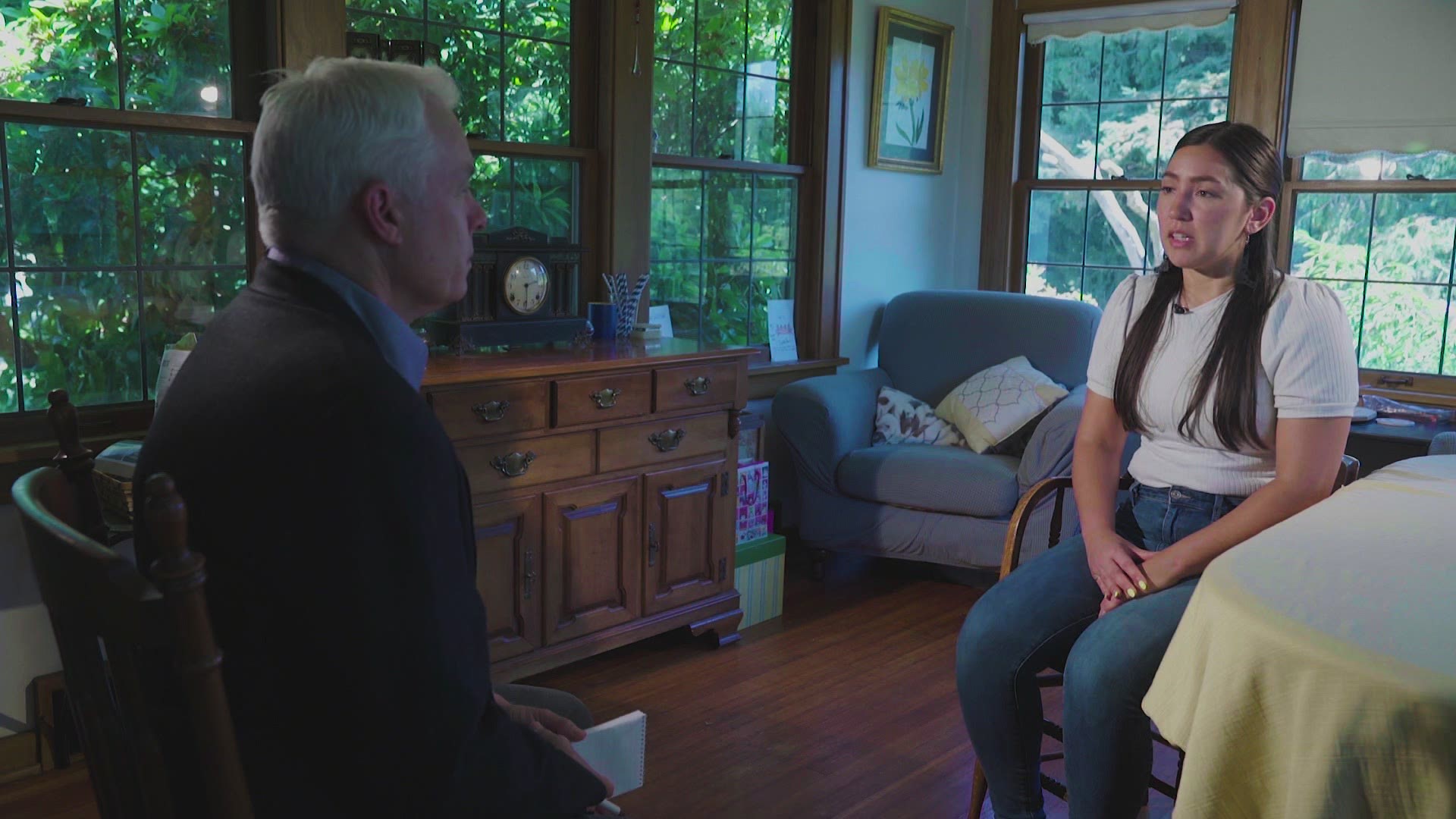Editor's note: This article contains subject matter that includes self-harm and attempted suicide.
KENT, Wash. — A Washington social worker named Seairra trembled on a January evening this year as she explained to Kent police officers how a foster teen nearly attacked her.
A 16-year-old autistic boy charged Seairra with a broken piece of glass, she said, and he threatened to stab her and another youth in state care.
“I asked him to put it down, and that’s when he responded….‘I’ll kill you. I’ll kill myself. I’m going to do it,’” Seairra told a police officer after the incident. “I was actually scared.”
The after-hours social worker was assigned to watch the boy that night at the Washington Department of Children, Youth and Families (DCYF) office in Kent, where he had been staying while waiting for a foster home placement. When officers arrived at the child welfare office, they found the teen holding the piece of glass up to his own throat, according to a review of police body video from the incident.
Cops convinced the teen not to hurt himself, and then a medic crew involuntarily committed him to a hospital for evaluation. Seairra and an officer on the scene both remarked it was unlikely the hospital would do much to help the troubled teen before discharging him back to the state. It was a common occurrence for that boy — and other foster youth in state care — to cycle in and out of the hospital without ever receiving access to intensive, long-term help.

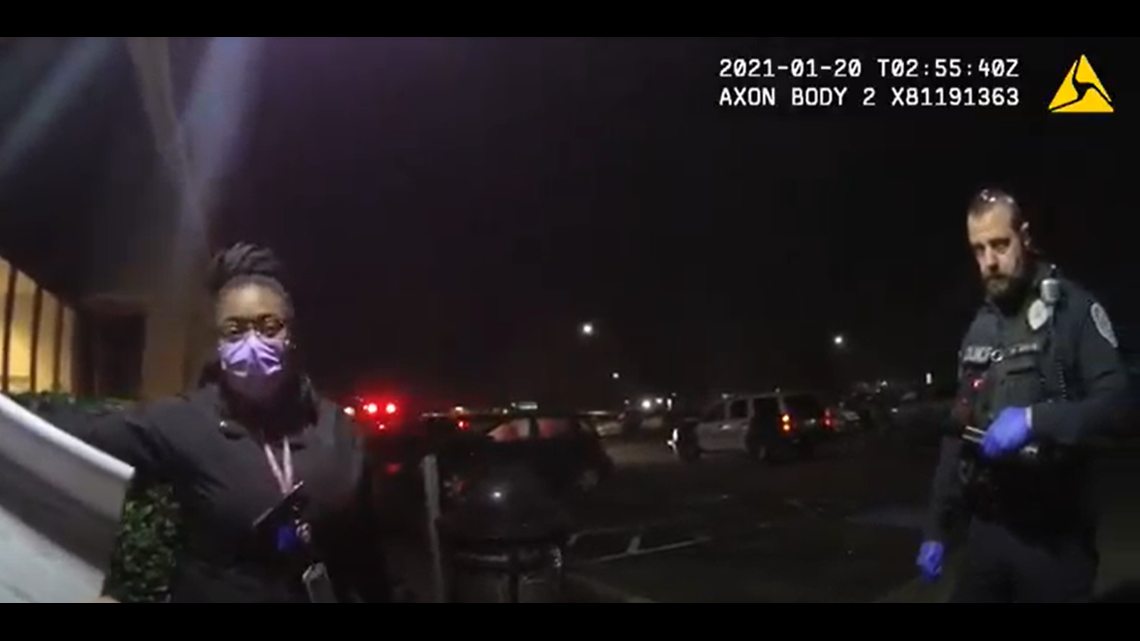
“What do you want done?” the officer asked Seairra. “Do you want to be the victim of that and press charges?”
“I don’t know,” Seairra replied.
The officer’s question immediately brought Seairra to tears, as she verbalized her internal conflict: Should she protect herself and prove actions have consequences or should she protect a vulnerable kid’s future?
“It’s just with, like, his mental health and him being a young African American man, it’s just so much,” she told the officer.
“The choice is yours,” the officer responded. “You don’t have to make a decision right now.”
Seairra decided the next day to press charges against the teen, who returned to the DCYF office less than 24 hours after the hospital admitted him, according to Kent police records. The social worker didn't comment on the case when KING 5 briefly reached her by phone last month.
Seairra’s emotional dilemma that night, captured on a police body camera, is one frequently shared by other current and former DCYF employees who have experience supervising “hard-to-place” foster youth during the night hours. It’s the time of day when the resources are scarce and calling law enforcement for support is widely viewed within the department as the go-to option and sometimes the only one.
“A lot of kids are triggered by a police officer's presence. It’s not a fun thing to do,” said Deanna Ginter, a former after-hours social worker, who quit her job at the Bellingham DCYF office last month. “I think the hardest part about being an after-hours social worker is that we can’t adequately help the kids. We don’t have the resources so we’re just left to figure it out as we go.”
Ginter is one of 30 current and former employees of Washington’s child welfare agency who spoke with reporters about how the state cares for foster youth without placements between the hours of 5 p.m. to 8 a.m., when the agency’s most inexperienced social workers — some recruited fresh out of college — are left alone to handle many of the most challenging and troubled kids in the state’s care.
Those interviews with state workers, along with a review of six hours of police body camera footage, dozens of police incident reports, internal DCYF emails and child welfare case notes, uncovered an unstable and chaotic environment for both the foster youth without placements and the after-hours social workers responsible for their well-being and safety.
“It’s been frustrating working (in the) after-hours unit, and just seeing all of the things that we can’t change, all of the ways that our youth have been mistreated, all the ways that employees are being mistreated,” said Ginter, who is among 25 past and present state workers who criticized the child welfare department’s after-hours tactics.

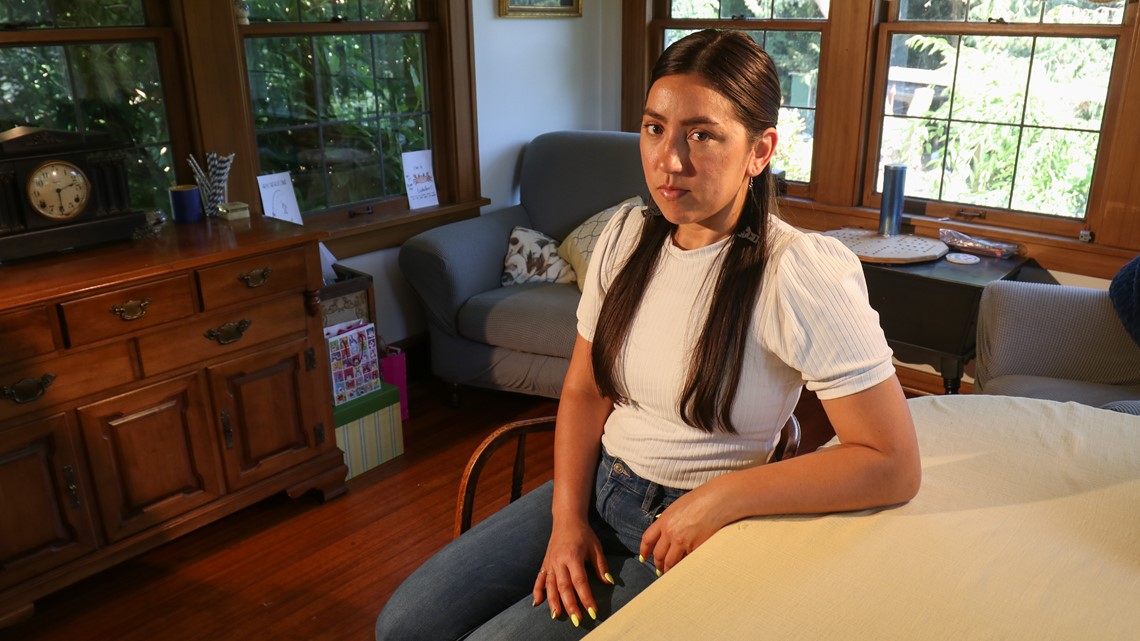
In May, a KING 5 investigation uncovered a years-long pattern of Washington child protection workers dangling basic necessities, like a safe, warm place to sleep, as a way to get challenging foster youth to behave or follow orders during the after-hours shift. The story prompted the Washington Office of Family and Children’s Ombuds, a state watchdog, to launch a probe into social workers’ allegations that DCYF punished hard-to-place foster youth by forcing them to sleep in social workers’ cars and in state offices without adequate bedding.
DCYF Secretary Ross Hunter repeatedly denied those claims following KING 5’s investigation, which “infuriated” Ginter and prompted her to go public with her own experience working in the field.
“It’s so frustrating to hear those things being denied, as somebody who is on the ground and has seen those things happening,” said Ginter, who added that supervisors instructed her, on multiple occasions, to stay with foster youth in cars overnight and make them uncomfortable as a form of punishment. “I didn’t feel like I could speak up. I didn’t feel like I could say anything.”
‘I just felt really ill-equipped’
Just over 200 DCYF employees work on the after-hours team, a group that has come to expect to face crises involving kids on a nightly basis. Some foster youth without placements, who have spent hundreds of nights in hotels or state offices, have been known to run away, destroy public property, assault state employees, harm other foster youth or hurt themselves.
Seven current and former after-hours employees said they lacked the tools and the de-escalation training to diffuse those bad situations, and they didn't feel equipped to effectively perform their jobs.
“I didn’t even know what I was supposed to be doing,” said Basia Cady, a former after-hours social worker who left the state child welfare agency last year. “I just felt really ill-equipped for a lot of the behaviors that these kids had, and I just don’t think we had the resources to effectively help them and to keep everyone safe.”

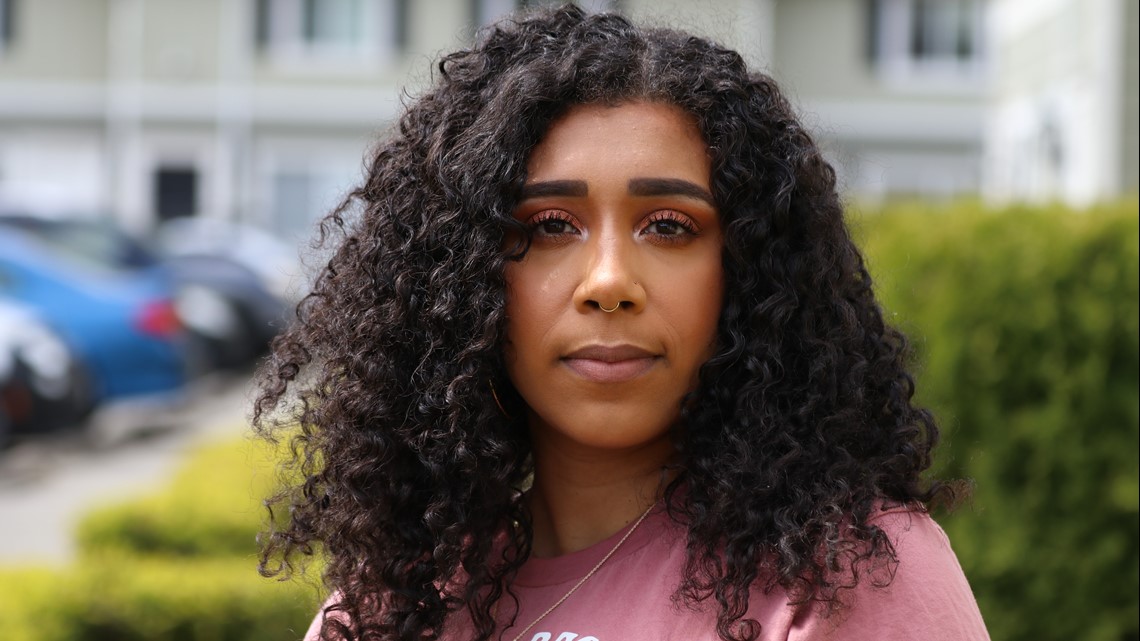
After-hours positions have historically served as an opportunity for people interested in social work to get their foot in the door at Washington's child welfare agency. DCYF intentionally recruits men and women with little to no prior job experience, marketing the positions as “a great opportunity for those starting in social work to gain experience in the field,” according to a review of DCYF job listings.
Eugenia Kang, a former after-hours social worker, said she had no prior experience working with kids and no therapeutic training when the state hired her straight out of college back in 2016.
“It was pretty scary,” Kang said. “We were just there with the kids. There was no real guidance on how to talk to them or how to interact with them, really.”
Alisia Gripe, another former after-hours social worker who quit the job in 2018 after a troubled foster child threatened to kill her and her family, said it never made sense to her that the “greenest” employees were responsible for such a high-stakes job.
“It should have been the most experienced social workers taking on that extent of vulnerable children and those vulnerable situations — not the green social workers who don’t know how to handle crisis interventions,” Gripe said.
Nancy Gutierrez, a DCYF spokesperson, said the department markets the job to people getting their start in the field because the positions don’t require “complex clinical work when assessing the safety of families, developing interventions and case planning.”
“Although most child welfare service positions could be considered high stress and challenging, after-hours positions have been an opportunity for staff to skill build before engaging in the more complex work of carrying a full caseload,” Gutierrez wrote in a statement.
RELATED: DCYF oversight board grills state child welfare leader about alleged punishment of foster youth
She said the the state implemented a specialized training course for after-hours employees last April, and the course is a now a requirement. Prior to the specialized course, after-hours staff took a general training course that’s offered to employees across the agency, Gutierrez said. After-hours social workers, she added, are also required to take a worker safety course, and they receive instruction on de-escalation strategies.
Still, after-hours social workers say they must navigate intense situations that they didn’t even realize were part of the job.
On one of Ginter’s most stressful days at work, she said she frantically chased after a 5-year-old foster boy, as he attempted to harm himself by running into moving traffic.
“He was screaming and crying and trying to run,” she said. “It was exhausting because I was trying to protect him from hurting himself, and I was alone. I couldn't even call my supervisor at that time because I was trying to wrestle him so he didn’t hurt himself. I remember thinking, ‘Oh my gosh, someone is going to think I’m trying to kidnap this kid.’”

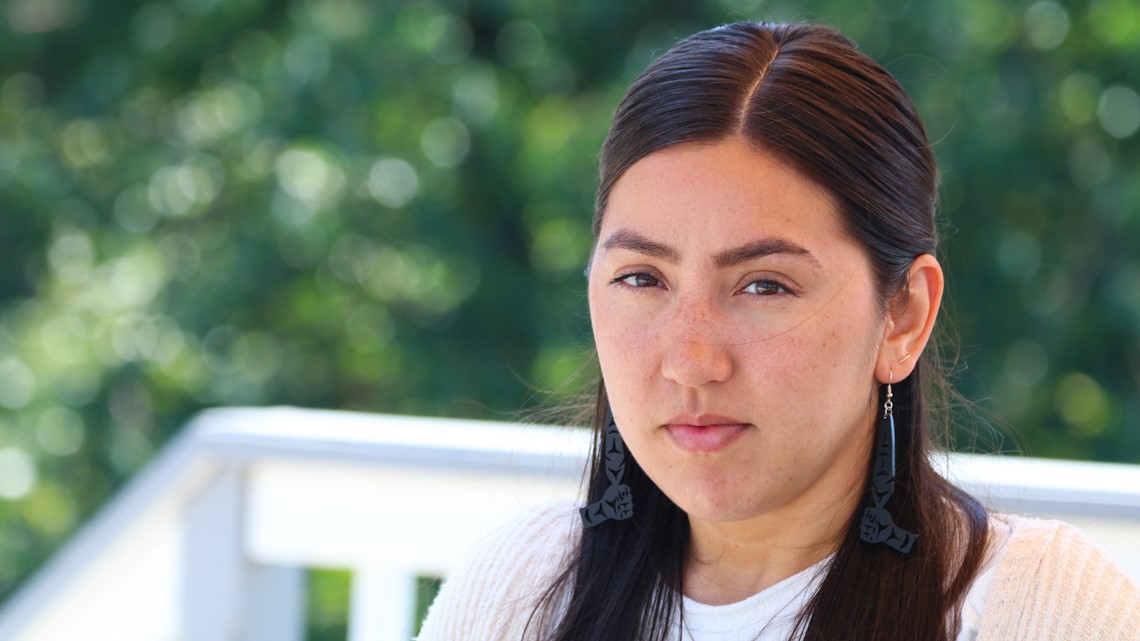
A current after-hours social worker in Kent, who spoke on the condition of anonymity to protect her state employment, said she regularly carries the weight of trying to keep potentially suicidal foster youth alive.
Abagail Lehman, 18, is one of the teens who the social worker said she felt obligated to work around the clock to protect.
Lehman, who has a learning disability, borderline personality disorder, anxiety and behavioral issues, said she repeatedly attempted suicide and began cutting herself after entering foster care at age 15. The teen, who spoke openly about her mental health conditions, said she decided to share her story to help other foster youth who struggle to find appropriate help in the child welfare system.

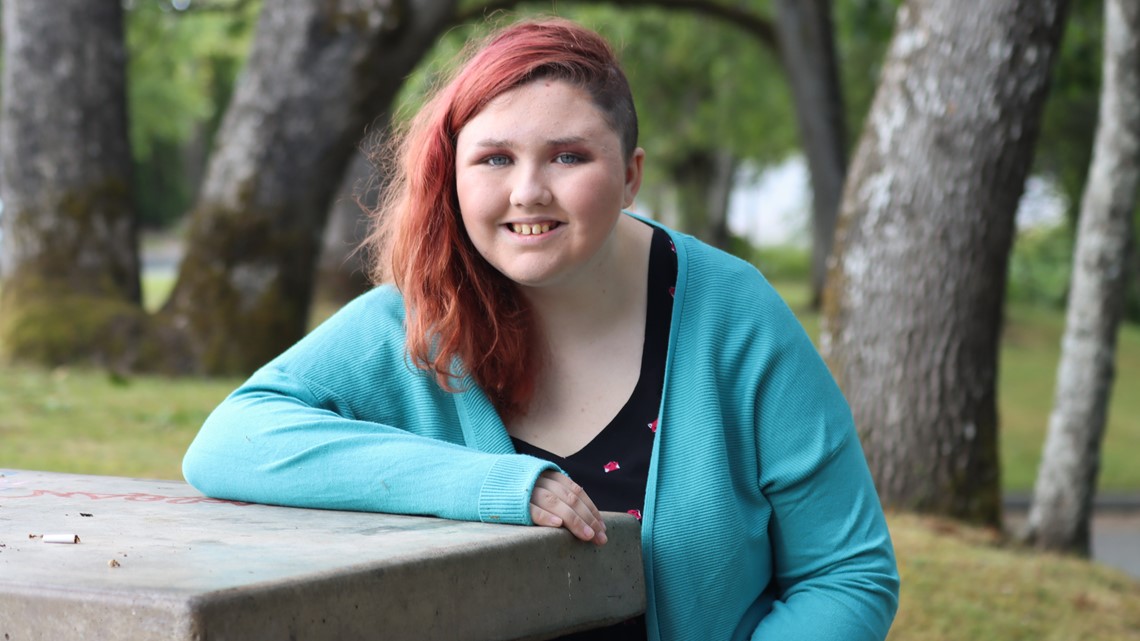
While she needed treatment at a long-term mental health facility or a therapeutic foster home placement with wrap-around care, Lehman said she spent many nights “frustrated” in unstable living conditions, sleeping on cots in state offices and bouncing around between hotels.
“We weren’t the right space for her to be in,” said the Kent after-hours social worker who, along with others, witnessed her instability in foster care over the course of several years. “I was terrified that on my watch she would kill herself. That’s incredibly stressful.”
Lehman said her depression and anxiety is what led her to attempt suicide. But there were times, she admitted, she injured herself so she could go to the hospital instead of sleeping in the DCYF office, where she said she felt unwanted, unloved and alone.
“Sometimes I’d cut so I’d have at least three or four days of stable placement, where I can live and not have to worry about eating or drinking or where I'm going to sleep,” she said. “The life I was living got to be too much for me, and it kind of made me explode."
Lehman, who is now enrolled in Washington's extended foster care program, lives at a residential mental health treatment center. She said she has regular access to a therapist and other specialized support that she didn't receive during her time sleeping in state office lobbies.
‘The officers aren’t going to do anything to save us’
Gutierrez, the DCYF spokesperson, said after-hours social workers have access to their supervisors, other department managers and local first responders when they encounter a crisis.
But some current and former after-hours social workers, like Ginter, said their supervisors weren't always helpful or responsive to their concerns. And some complained that security guards hired to help with the most challenging kids ended up escalating bad situations instead of diffusing them.
When social workers call law enforcement, records show police officers sometimes decline to offer to help.
"Oftentimes, police are very dismissive of us," Ginter said. "They don’t think that when we call them we’re calling about a true emergency, and so they show up ready to leave."
In Kent, where a high number of foster youth without placements end up, police officers responded to the child welfare office more than 200 times since January 2020, according to a KING 5 review of Kent Police Department records.
In one incident two months ago, body cameras captured video of foster youth rampaging through the Kent DCYF office, where the kids broke into a secured area and destroyed state property. The police call results in a standoff between the cops and social workers.
"This is their job as de facto parents," one Kent police officer commented to his fellow cops.
One of the officers informed the state workers that law enforcement didn't have the legal authority to remove the group of foster teens from the secured office area.
Seairra, the same after-hours social worker who the 16-year-old boy threatened to stab, was among the first to speak up about her helplessness and frustration.
“We all just need to leave. Let them tear (the office) up at this point, because we can’t get help,” Seairra said in front of the police officer and her co-workers. “I’ve almost been stabbed to death. I’ve been attacked by another kid, and I’ve watched kids keep getting attacked. What am I supposed to do? I’m done. The officers aren’t going to do anything to save us anymore or help us anymore.”
An after-hours supervisor chimed in next.
“We’re honestly all concerned for our safety,” she told the officer. “The (foster youth) are threatening us. They are in there punching their hands through their fists, calling us names, cussing at us. So we’re supposed to be OK with that and feel unsafe?”
“What am I supposed to do about it?” the officer replied. “I can’t take them to jail. The jail won’t take them.”
Eventually, cops persuaded the teens to leave the child welfare office later that night.
Significant changes coming
Last month, as part of an ongoing lawsuit, a federal judge ordered DCYF to put an end to its years-long practice of placing foster youth in hotels, state offices and social workers' cars overnight.
The change, which must take effect by Nov. 1, will have a significant impact on hard-to-place Washington foster youth and DCYF's operations during the after-hours shift.
The state hasn't shared where it plans to house the foster youth once those options are no longer on the table, leaving more uncertainty for the social workers who have become accustomed to working in uncertain conditions every night.
If you need help
The National Suicide Prevention Lifeline is 1-800-273-8255. It’s free, confidential and available 24 hours a day.
The Washington Recovery Help Line is an anonymous and confidential help line that provides crisis intervention and referral services for Washington state residents who are experiencing substance use disorder or mental health challenges. Call or text 866-789-1511.
TeenLink, a help line for Washington state teenagers, accepts text messages and phone calls at 1-866-833-6546.
Become a foster care parent
If you’re interested in becoming a Washington state foster parent, here’s how to contact the Department of Children, Youth, and Families to get more information about next steps.
Contact the reporters
Taylor Mirfendereski is a KING 5 investigative reporter, who specializes in multimedia storytelling, longform reporting and digital projects. Follow her on twitter at @taylormirf. E-mail her at tmirfendereski@king5.com or contact her via Signal at 206-348-4106.
Chris Ingalls is a KING 5 investigative reporter. Follow him on twitter @CJIngalls. E-mail him at cingalls@king5.com or contact him via Signal at 971-267-5320.

